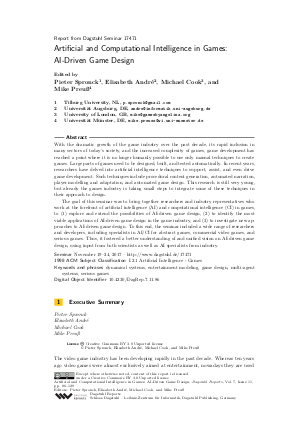Artificial and Computational Intelligence in Games: AI-Driven Game Design (Dagstuhl Seminar 17471)
Authors Pieter Spronck, Elisabeth André, Michael Cook, Mike Preuß and all authors of the abstracts in this report
-
Part of:
Issue:
Dagstuhl Reports, Volume 7, Issue 11
Part of: Volume: Dagstuhl Reports, Volume 7
Part of: Journal: Dagstuhl Reports (DagRep) - License:
 Creative Commons Attribution 3.0 Unported license
Creative Commons Attribution 3.0 Unported license
- Publication Date: 2018-03-28
File

PDF
DagRep.7.11.86.pdf
- Filesize: 2.65 MB
- 44 pages
Document Identifiers
Subject Classification
Keywords
- dynamical systems
- entertainment modeling
- game design
- multi-agent systems
- serious games
Metrics
- Access Statistics
-
Total Accesses (updated on a weekly basis)
0PDF Downloads0Metadata Views
Abstract
With the dramatic growth of the game industry over the past decade, its rapid inclusion in many sectors of today's society, and the increased complexity of games, game development has reached a point where it is no longer humanly possible to use only manual techniques to create games. Large parts of games need to be designed, built, and tested automatically. In recent years, researchers have delved into artificial intelligence techniques to support, assist, and even drive game development. Such techniques include procedural content generation, automated narration, player modelling and adaptation, and automated game design. This research is still very young, but already the games industry is taking small steps to integrate some of these techniques in their approach to design.
The goal of this seminar was to bring together researchers and industry representatives who work at the forefront of artificial intelligence (AI) and computational intelligence (CI) in games, to (1) explore and extend the possibilities of AI-driven game design, (2) to identify the most viable applications of AI-driven game design in the game industry, and (3) to investigate new approaches to AI-driven game design. To this end, the seminar included a wide range of researchers and developers, including specialists in AI/CI for abstract games, commercial video games, and serious games. Thus, it fostered a better understanding of and unified vision on AI-driven game design, using input from both scientists as well as AI specialists from industry.
Cite As Get BibTex
Pieter Spronck, Elisabeth André, Michael Cook, and Mike Preuß. Artificial and Computational Intelligence in Games: AI-Driven Game Design (Dagstuhl Seminar 17471). In Dagstuhl Reports, Volume 7, Issue 11, pp. 86-129, Schloss Dagstuhl – Leibniz-Zentrum für Informatik (2018)
https://doi.org/10.4230/DagRep.7.11.86
BibTex
@Article{spronck_et_al:DagRep.7.11.86,
author = {Spronck, Pieter and Andr\'{e}, Elisabeth and Cook, Michael and Preu{\ss}, Mike},
title = {{Artificial and Computational Intelligence in Games: AI-Driven Game Design (Dagstuhl Seminar 17471)}},
pages = {86--129},
journal = {Dagstuhl Reports},
ISSN = {2192-5283},
year = {2018},
volume = {7},
number = {11},
editor = {Spronck, Pieter and Andr\'{e}, Elisabeth and Cook, Michael and Preu{\ss}, Mike},
publisher = {Schloss Dagstuhl -- Leibniz-Zentrum f{\"u}r Informatik},
address = {Dagstuhl, Germany},
URL = {https://drops.dagstuhl.de/entities/document/10.4230/DagRep.7.11.86},
URN = {urn:nbn:de:0030-drops-86722},
doi = {10.4230/DagRep.7.11.86},
annote = {Keywords: dynamical systems, entertainment modeling, game design, multi-agent systems, serious games}
}
